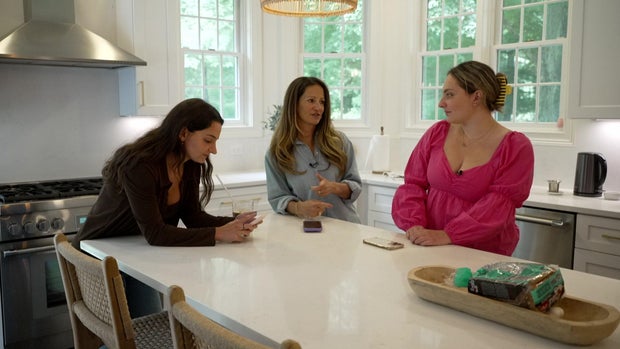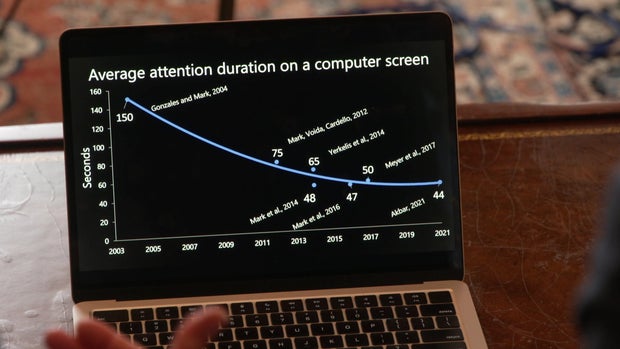Does it ever seem to be one thing is happening with our consideration spans? The world’s #1 most downloaded app is TikTok, an infinite stream of very quick video clips. Newspaper articles are getting shorter, and they inform you how a lot time you may must learn them.
And the common size of a shot in a film is now under five seconds.
Lately, multi-tasking when you’re tasking is the norm amongst younger folks. Simply ask counselor Lauren Barnett and her daughters, Zoe and Sasha.
“We’re at all times holding one other system,” stated Sasha. “For those who’re watching one thing, I really feel like everybody at all times has their telephone subsequent to them.”
Zoe stated, “My roommates would all be doing work on their computer systems, watching TV, but in addition on their telephones texting folks.”
Sasha admitted to having a brief consideration span: “Yeah. I am unable to sit in lengthy courses.”
Pogue requested, “Is there any cell in your physique that is like, ‘As quickly as that is over, I am gonna go proper over and [get my phone]’?”
“Each cell!” laughed Barnett.
CBS Information
Gloria Mark, an consideration researcher on the College of California, Irvine, is creator of “Attention Span: A Groundbreaking Way to Restore Balance, Happiness and Productivity” (Hanover Sq. Press). She says there may be scientific proof consideration spans are getting shorter.
“We began learning consideration span size over 20 years in the past,” Mark stated. “We might shadow folks with a stopwatch, and each time they shifted consideration, we would click on, ‘Cease’ In 2003, we discovered that spotlight spans averaged about two-and-a-half minutes on any display screen earlier than folks switched. Within the final 5, six years, they’re averaging 47 seconds on a display screen.”
And the way can somebody get something achieved should you’re supposed to write down a report, and 47 seconds later you are switching to a different app? “You do it with nice issue,” she stated.
CBS Information
Mark maintains {that a} shorter consideration span has three downsides: “The primary is that folks make extra errors after they do consideration shifting; second draw back is that it takes longer to do one thing, ‘trigger now we have to reorient to each new job each time we shift; the third draw back — possibly that is the worst of all — is that stress will increase. When persons are engaged on a number of duties and so they must shift their consideration, their blood stress rises.”
You do not have to be a professor to guess on the trigger of our higher distractability: It is know-how, in fact … telephones, social media, texting. Sasha Barnett can attest to that.
Requested to enter her iPhone’s Display screen Time settings to see what number of unlocks she had the day earlier than, she was shocked to seek out she had 236 pickups. “That is so much!” she laughed.
So, is that it? Have we turn into overstimulated zombies? Cornell psychology professor emeritus James Chopping does not suppose it is time to abandon all hope. “I do not suppose our consideration spans have modified actually in any respect,” he stated. “There is no information for that.
“I’d level out that TSA baggage scanners work two-hour shifts, and that is fairly intensive work for 2 hours. And many people have watched youngsters play their video games for a lot of hours at a time. It strikes me that that sort of consideration span is fairly spectacular.”
However what about that enterprise of flicks photographs getting shorter? We have come a great distance from the pacing of “2001: A House Odyssey” in 1968 … to final yr’s “Prime Gun: Maverick.”
However Chopping says that it has nothing to do with consideration spans — we simply know the language of flicks higher than our ancestors did. “We have now gotten, over the many years, so much sooner at choosing up visible materials,” he stated. “It type of is smart {that a} filmmaker would make the photographs shorter. The filmmaker does not must dwell on one thing like that.”
Chopping additionally factors out that though TikTok movies are very quick, films themselves are getting longer. “There’re much more films pushing three hours now than there was once,” Chopping stated. “We even have long-form tv, the place issues can go on for eight episodes, 12 episodes, or no matter.”
Hanover Sq. Press
One factor’s for certain: As Lauren Barnett factors out, know-how’s not going away: “It is their complete world. There is no job the place they could possibly be with out it. There is no educational setting the place they could possibly be with out it. There is no social interplay, until they go away to the mountains for 2 months!”
Professor Gloria Mark stated she shouldn’t be an advocate for throwing away know-how: “What we have to do as a substitute is discover ways to reside with it.”
So, she provided a few ideas for staying centered:
- First, while you really feel the itch to vary duties, analyze why. If it is simply boredom or procrastination, make a cope with your self to work one other 20 minutes, after which deal with your self to a reward.
- Second, image your self on the finish of the day. What do you wish to have achieved? What do you wish to really feel? “A concrete visualization of your self sitting on the sofa, you realize, watching your favourite present is de facto good motivation,” she stated.
Pogue stated to the Barnetts, “My grandfather died simply shy of his 107th birthday, and he informed me that his mother and father would say, ‘You are gonna rot your mind listening to that new-fangled radio.’ For me, it was, ‘You are gonna rot your mind watching TV.’ For you, it is, ‘You are gonna rot your mind on social media.’ Each technology thinks that know-how is ruining the following one. That is why I am hung up on this notion of, is it worse? Or is it simply totally different?”
“Will depend on whether or not they’re contemplating productiveness, or contemplating well-being,” stated Barnett. “And I believe they’re two very various things. I believe they’re going to be simply as productive, however their well-being, with all that elevated productiveness, there is not any query that their well-being is negatively impacted. So, therein lies the dilemma.”
For more information:
Story produced by Gabriel Falcon. Editors: Joseph Frandino and Chad Cardin.
See additionally:






Discussion about this post